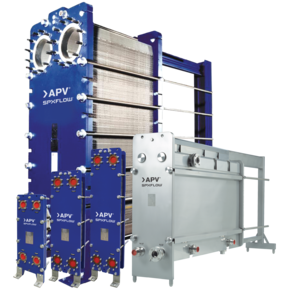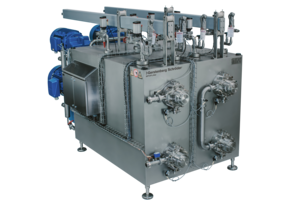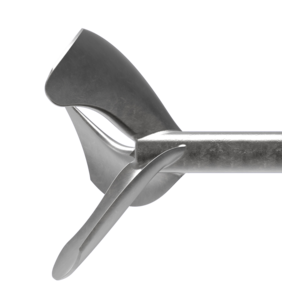STORIES IN THE MAKING
Energy powers just about everything we do. Nowhere is this more true than in manufacturing. Whether it's dairy or construction, water treatment or pharmaceuticals, businesses around the world rely on energy to move them forward. The challenge is energy is expensive, too often negatively contributes to climate change and in many places it is scarce.
This is why manufacturing businesses around the world include energy conservation as one of their most important sustainability goals.
At SPX FLOW, we constantly strive to make our facilities more energy efficient. For example, after conducting energy audits at all our European manufacturing facilities, we identified 40 projects with the potential to significantly reduce our energy footprint. At two of these locations, we installed solar panels for a reliable source of onsite, renewable energy. One of these locations generates enough clean energy to fully power its entire operations.
Our commitment to energy conservation is also prominent in the solutions we design, manufacture and service for our customers, which helps them reduce energy while increasing productivity. A few examples include:
Products—Outlined below:
- Plate Heat Exchangers
 High-performing heat exchangers are the heart of many heating and cooling processes across a variety of industries. That’s why it’s critical to ensure heat exchangers are running at peak performance. An on-site equipment audit based on an inspection by SPX FLOW quickly reveals whether a heat exchanger is operating efficiently to deliver the results you need and expect. For most equipment, wear and tear are unavoidable and so at some point during its service life, maintenance and possibly reconditioning is required. Reconditioning of plate heat exchangers restores thermal performance and operating efficiency to original levels. We recommend these APV solutions.
High-performing heat exchangers are the heart of many heating and cooling processes across a variety of industries. That’s why it’s critical to ensure heat exchangers are running at peak performance. An on-site equipment audit based on an inspection by SPX FLOW quickly reveals whether a heat exchanger is operating efficiently to deliver the results you need and expect. For most equipment, wear and tear are unavoidable and so at some point during its service life, maintenance and possibly reconditioning is required. Reconditioning of plate heat exchangers restores thermal performance and operating efficiency to original levels. We recommend these APV solutions.Real solutions for operational efficiency and energy savings.
- Scraped Surface Heat Exchanger: Nexus
 There are innovators and then there are sustainability superheroes. One way our experts try to approach this superhero level is by designing with your sustainability goals in mind for new and seasoned machinery. In the case of this scraped heat exchanger, it’s all about leveraging carbon dioxide (CO2) to save energy in the heat transfer process. Within the machine, the margarine and shortening crystallization process takes place. Leveraging CO2 as refrigerant instead of traditional ammonia, improves heat transfer by approximately 30% in addition to improving quality product.
There are innovators and then there are sustainability superheroes. One way our experts try to approach this superhero level is by designing with your sustainability goals in mind for new and seasoned machinery. In the case of this scraped heat exchanger, it’s all about leveraging carbon dioxide (CO2) to save energy in the heat transfer process. Within the machine, the margarine and shortening crystallization process takes place. Leveraging CO2 as refrigerant instead of traditional ammonia, improves heat transfer by approximately 30% in addition to improving quality product.Because the Nexus leverages CO2 as a very efficient refrigerant, its external heat transfer coefficient is two to three times higher than that of ammonia. This increases the total heat flux by up to 40, reducing heat transfer costs.
Test results show that using CO2 at -10°C reduces energy consumption in the refrigeration system by up to 30% compared to using an ammonia compressor within the exchanger at 20°C.
It’s the same Nexus, only better.
- Side-Entry Mixer: Philadelphia Advanced Pitch Propeller
 The primary advantage of the Philadelphia Advanced Pitch Propeller mixer, with its patented circular rate and corresponding fluid flow characteristics, is its energy savings. Intentionally designed with a smaller footprint to reach deeper into tanks, this powerful impeller requires less energy to provide faster blending in critical applications such as crude blending for FCC units, gasoline blending and high-density products. When blending multiple fluids with a 16% or greater difference in density, the Philadelphia Advanced Pitch Propeller uses up to 50% less power than traditional technologies.
The primary advantage of the Philadelphia Advanced Pitch Propeller mixer, with its patented circular rate and corresponding fluid flow characteristics, is its energy savings. Intentionally designed with a smaller footprint to reach deeper into tanks, this powerful impeller requires less energy to provide faster blending in critical applications such as crude blending for FCC units, gasoline blending and high-density products. When blending multiple fluids with a 16% or greater difference in density, the Philadelphia Advanced Pitch Propeller uses up to 50% less power than traditional technologies.Faster. Cleaner. Uses less energy. This is sustainability in action.
At SPX FLOW, sustainability is more than just an industry buzzword. It’s our mission. Within our own facilities and through the products and solutions we engineer and manufacture — every day is Earth Day.
Post Author

Vice President, Enterprise, Safety & Sustainability
Tracy Beaudry is the Vice President of Enterprise, Safety and Sustainability, overseeing global operational and technical safety for solution makers and their innovations.
Contact Tracy Beaudry, CSP